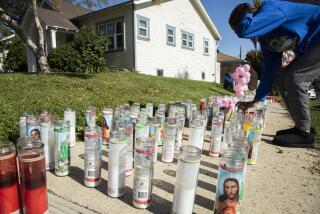Harbor Gateway teen’s slaying case goes to jurors
- Share via
In the days after 14-year-old Cheryl Green was gunned down, residents, activists and politicians took to the streets of Harbor Gateway, decrying the senseless, racially motivated slaying of a child and protesting the gang activity that long plagued the area.
But a different message quietly appeared on the sidewalk just a few feet from the driveway where Green died.
The message, in black spray paint, read “204ST NK.”
The graffiti, a reference to a racial epithet and killing African Americans, was a brazen pronouncement of the vitriolic racial hatred of the 204th Street gang that resulted in the loss of two young, innocent lives, a prosecutor told jurors this week.
“All black people are their enemies,” Deputy Dist. Atty. Gretchen Ford said in the murder trial of two Latino gang members. “Really innocent people could die for no reason other than the ridiculous ideas of this gang.”
The case against Jonathan Fajardo, 22, and Daniel Aguilar, 23, was handed to the jury Wednesday morning after a two-week trial that explored the inner workings of the 204th Street gang and the killings its members allegedly carried out to maintain its reign over the neighborhood. Fajardo is charged with Green’s slaying; both defendants stand accused in the killing of a potential witness, 21-year-old Christopher Ash.
The jury will also decide whether Green’s 2006 death constituted a hate crime. If convicted, Fajardo faces the death penalty.
Fajardo, who was 18 when he allegedly shot and killed Green, was “cavalier” enough to sing during police interviews and warned that the gun used in the attack was still out there and could be used to kill other blacks, police, rival gang members or snitches, Ford said.
Ford also told jurors that even though Aguilar didn’t stab Ash, he was just as guilty of murder as those who did. He knew what would happen to Ash, his best friend, when he lured him to a garage to be killed for being a snitch, then later helped clean up, Ford said.
“He walked over and kicked his dying best friend,” she said.
Ash, who prosecutors said was suspected by the gang of talking to police about Green’s murder, was found on the side of a road in Carson with 80 stab wounds.
Defense attorneys in their closing arguments attacked the credibility of a central prosecution witness, a fellow 204th Street gang member who admitted to stabbing Ash and described in detail the night of his murder.
Fajardo’s attorney, Thomas White, said the witness, Jose Covarrubias, told authorities what they wanted to hear to lighten his sentence. Covarrubias is expected to get 22 years in prison.
White also disputed that Green’s killing was a hate crime, saying politicians and prosecutors jumped on the “hate crime bandwagon” because of the publicity surrounding the teen’s death.
“It was an accident that rose of fear and anger,” he said. “This was a rash impulse.”
Antonio Bestard, Aguilar’s attorney, contended his client did not know Ash was going to be killed and was following orders from older gang members because he would have been killed otherwise.
Green’s mother, Charlene Lovett, who sat through the trial, said she was eager for the trial to be over so the family could move past the tragedy.
“It’s hard to think of her and enjoy the memories when I think of how she left,” Lovett said.
victoria.kim@latimes.com
More to Read
Sign up for Essential California
The most important California stories and recommendations in your inbox every morning.
You may occasionally receive promotional content from the Los Angeles Times.














